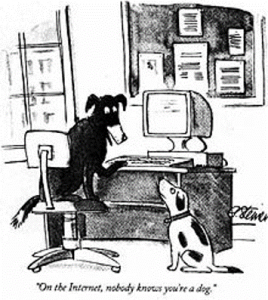 February 2020
February 2020
The internet was and is a great invention. It also has a problem that needs fixing.
“On the internet nobody knows you’re a dog”
Peter Steiner, The New Yorker, 1993
Toronto’s condo community has embraced and relies on the internet. E-mail and text messaging have replaced letters and telephone. Websites and internal communication systems within a community are dependent on internet access by management and residents. Social media allows residents to communicate with each other as a group. Telephone and TV services are now delivered over the internet and WiFi is available throughout a building. It won’t be long before lights, thermostats, refrigerators and door locks become connected to the internet.
 Making the best use of the internet means understanding its limitations.
Making the best use of the internet means understanding its limitations.
The internet was designed for one-way communication. Anyone can send or distribute via the internet. It is nearly impossible to go the other way and determine the source of a communication. This has allowed posters to remain anonymous under the guise of privacy and was initially considered advantageous.
Today’s hackers, bots, scams, viruses, phishing, financial fraud and malicious posts over the internet would not be possible, or at least dramatically reduced, if the source of every internet communication were easily identified. The need for every computer user to invest in security to protect their computer systems from these intrusions would be lessened.
A better solution would be to ensure nobody can send anonymous e-mail or make anonymous postings. This would eliminate, or at least reduce, incidents of hacking, spamming, cyberbullying and anonymous “hate” messages. Condo communities would find a higher level of civil discourse and integrity in their communities if owners and residents could no longer send anonymous communications to management, directors and other residents.
One approach for communities to follow is to ignore and refuse to publicize communications – internet, e-mail or social media – where a sender is not identified and verifiable. This would improve the quality of communication and discourage the anonymity behind hidden agendas.







